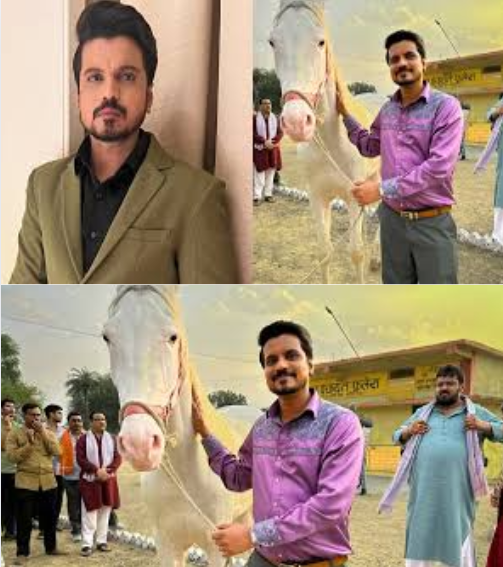Sad News as Popular Panchayat fame Tv Actor in Critical condition after a Heart Attack!
The entertainment industry was recently jolted by an alarming piece of news. Asif Khan, the talented actor known for his roles in acclaimed web series like Panchayat and Mirzapur, suffered a heart attack at just 34 years old. Though now stable and on the road to recovery, the incident serves as a sobering reminder that heart disease is no longer confined to older age groups. With increasing reports of heart attacks occurring in individuals in their 30s—or even younger—the question arises: what exactly is putting the hearts of young people at such high risk?
On Monday evening, Asif Khan was admitted to the hospital after experiencing severe chest discomfort. The news spread rapidly across social media, with fans and fellow actors expressing concern and sending their best wishes. Fortunately, Asif took to Instagram shortly after, providing an update that he was recovering well. In a heartfelt note to his followers, he expressed gratitude for the support and reassured everyone that his health was improving.
Still, the incident left many fans shocked. Asif, known for portraying relatable, grounded characters, has always appeared fit and healthy. His experience sheds light on a growing issue among millennials and Gen Z: the increasing prevalence of heart disease among young adults. Gone are the days when heart attacks were seen as a condition reserved for people in their 50s or 60s. Today, lifestyle diseases are catching up much earlier, often with little to no warning signs.
Experts in the field of cardiology and preventive medicine are not surprised by this trend. In recent years, they’ve seen a surge in cases of heart attacks, strokes, and other cardiovascular events among people in their late 20s and 30s. A key contributing factor is the high-stress, fast-paced lifestyle that has become the norm. Long work hours, constant multitasking, irregular meals, minimal exercise, and chronic sleep deprivation are taking a toll on the cardiovascular health of the younger population.

Stress is one of the most significant silent killers in modern life. It doesn’t just weigh on your mind—it manifests physically, often in ways that go unnoticed until a crisis occurs. When the body is under continuous stress, it produces excessive amounts of cortisol and adrenaline—two hormones that, when elevated for extended periods, can lead to inflammation, increased blood pressure, and damage to the blood vessels surrounding the heart. Over time, this sets the stage for major cardiac events.
Another factor compounding the problem is a culture that glorifies overworking and hustle. Many young professionals take pride in their ability to function on four hours of sleep or push themselves through 16-hour workdays. While ambition is commendable, it should never come at the expense of basic health needs. Skipping meals, excessive caffeine consumption, staying sedentary for long hours, and lack of hydration are everyday habits that can cumulatively weaken the heart.
Exercise, which should be a preventive tool, can sometimes be misused. Young people often push their bodies to extremes at the gym, engaging in high-intensity workouts without adequate rest or medical clearance. Sudden intense physical exertion—especially in someone who is already sleep-deprived or stressed—can be dangerous. In fact, there have been multiple cases where young men have suffered cardiac arrests during or immediately after a strenuous workout session. The key is to strike a balance between activity and recovery.
Then there is the elephant in the room: smoking and vaping. These habits are increasingly common among young adults, despite widespread awareness of their harmful effects. Asif Khan’s case has brought renewed attention to this issue, as many health experts point out that tobacco use is a leading cause of premature heart disease. Studies show that nearly 90% of heart attacks in individuals under 40 can be linked directly to cigarette smoking. Smokers are more than twice as likely to have a heart attack as non-smokers. And while vaping is often marketed as a “safer” alternative, it is far from harmless. E-cigarettes contain nicotine and other chemicals that can increase heart rate, elevate blood pressure, and cause long-term damage to arterial walls.

Beyond smoking, dietary habits are also a major culprit. Fast food, processed snacks, sugary beverages, and high-fat meals have become staples in many people’s diets due to their convenience. The high levels of sodium, trans fats, and added sugars in these foods contribute to obesity, high cholesterol, and hypertension—all of which are major risk factors for heart attacks. Alarmingly, many young individuals with seemingly normal BMIs still have high visceral fat or “hidden fat” around their organs, which can be equally dangerous.
Dehydration is another often-overlooked risk. In the rush of work and daily life, many people forget to drink sufficient water. Even mild dehydration can increase the viscosity of blood, leading to higher chances of clot formation and pressure on the heart. While water might seem like a trivial aspect of health, maintaining proper hydration is crucial for optimal circulation and heart function.
What makes the situation even more concerning is that many of these risk factors are asymptomatic. You could be walking around with high cholesterol or hypertension without any visible signs. It’s often not until a person suffers a major cardiac event that the underlying conditions come to light. That’s why regular health check-ups, even for those in their 20s and 30s, are becoming increasingly important. Simple blood tests, blood pressure monitoring, and ECGs can provide valuable insight into one’s cardiovascular health.
Family history also plays a critical role. If there is a history of heart disease or diabetes in your immediate family, it’s important to be especially vigilant. Genetic predisposition can significantly increase one’s risk, and in such cases, preventive action becomes not just a recommendation, but a necessity.
Mental health is another integral component. Anxiety, depression, and emotional burnout are often dismissed or stigmatized, especially among men. However, poor mental health can be a major contributing factor to heart disease. Chronic stress and unresolved emotional trauma can elevate inflammation markers in the body, disturb sleep cycles, and create unhealthy coping mechanisms such as binge eating, smoking, or excessive alcohol consumption.

In light of Asif Khan’s recovery, many are now taking a step back to assess their own habits and health choices. His openness about the situation and his willingness to talk about it publicly has helped remove some of the stigma around young people experiencing serious health issues. It’s a brave step—and hopefully a catalyst for more conversations around preventive healthcare.
The actor’s experience also underscores the importance of listening to one’s body. Often, early signs of a heart problem—such as fatigue, shortness of breath, chest discomfort, or irregular heartbeats—are ignored or attributed to stress or indigestion. In young people, symptoms can also be atypical, leading to delayed diagnosis. It is essential to take any unusual or persistent symptom seriously and seek medical attention promptly.
Asif Khan’s journey, though frightening, ultimately had a positive outcome. He is now stable, recovering well, and has promised to prioritize his health going forward. The incident could have ended very differently—and for many, it has. His story is a timely reminder that no one is immune to illness, regardless of age, fame, or fitness. It reminds us that health is not something to be taken for granted or postponed for later.
In today’s world, where technology has brought convenience but also new forms of stress, taking care of one’s heart should be a daily priority. It’s time to normalize eight hours of sleep, balanced meals, mental health days, digital detoxes, and routine check-ups. It’s time to challenge the toxic work culture that equates overwork with success. And most importantly, it’s time to remember that the body is not invincible—it has limits, and it speaks. All we have to do is listen.
We wish Asif Khan a complete and speedy recovery. May his experience spark a larger awareness and encourage young people everywhere to treat their health with the seriousness it deserves.
Play video :
News
234 Türk Esirden TEK BİRİ ÖLMEDİ! 💀 Amerikalıların YARISI Öldü — SIRLARI NE?
234 Türk Esirden TEK BİRİ ÖLMEDİ! 💀 Amerikalıların YARISI Öldü — SIRLARI NE? . . . “234 Türk Esirden TEK…
Yağmurlu Gece: Şoförü Aşağıladı, Kim Olduğunu Öğrenince Olduğu Yere Yığıldı!
Yağmurlu Gece: Şoförü Aşağıladı, Kim Olduğunu Öğrenince Olduğu Yere Yığıldı! . . . “Yağmurlu Gece: Şoförü Aşağıladı, Kim Olduğunu Öğrenince…
Zalim Mafya Babasına Hiçbir Hemşire Dayanamadı—Fakir Hemşire Kuralları Yıkınca HerŞey Baştan Değişti
Zalim Mafya Babasına Hiçbir Hemşire Dayanamadı—Fakir Hemşire Kuralları Yıkınca HerŞey Baştan Değişti . . . “Zalim Mafya Babasına Hiçbir Hemşire…
YOLCU UÇAĞIYLA JET NASIL DÜŞÜRÜLÜR? İşte Türk Pilotun O Efsane Hamlesi!
YOLCU UÇAĞIYLA JET NASIL DÜŞÜRÜLÜR? İşte Türk Pilotun O Efsane Hamlesi! . . . “Yolcu Uçağıyla Jet Nasıl Düşürülür? İşte…
İki savaş pilotu 1987’te kayboldu — 31 yıl sonra radar verileri gerçeği gösterdi…
İki savaş pilotu 1987’te kayboldu — 31 yıl sonra radar verileri gerçeği gösterdi… . . . “İki Savaş Pilotu 1987’de…
BM Komutanlığı ‘TÜRK TUGAYI İMHA EDİLDİ’ Dedi! 😮 Tahsin Yazıcı ‘GÖREV VERİN’ Cevabını Gönderdi!
BM Komutanlığı ‘TÜRK TUGAYI İMHA EDİLDİ’ Dedi! 😮 Tahsin Yazıcı ‘GÖREV VERİN’ Cevabını Gönderdi! . . . “Türk Tugayı ve…
End of content
No more pages to load







